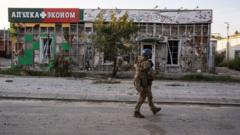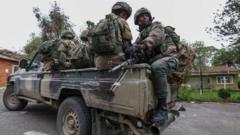As Ukraine's conflict with Russia evolves, the increasing frequency and sophistication of Ukrainian covert operations within Russia raise significant concerns regarding security and the extent of Ukraine's strategic capabilities.
Ukraine's Covert Operations: A New Era of Targeted Strikes Inside Russia

Ukraine's Covert Operations: A New Era of Targeted Strikes Inside Russia
Ukrainian intelligence conducts striking and bold operations within Russia, targeting military leadership and political figures.
In a shocking revelation, recent covert operations carried out by Ukrainian agents have successfully targeted high-ranking Russian military officials within the capital, illustrating a dramatic escalation in the ongoing conflict. The assassination of Lt Gen Igor Kirillov, who led Russian forces in charge of radiation, biological, and chemical defense, marked a pivotal moment; he is regarded as the highest-ranking military official eliminated outside of Ukraine since the invasion began. Reports confirm that Ukrainian sources acknowledge their responsibility for this meticulously planned operation, which involved the strategic placement of explosives within an abandoned electric scooter. This innovative choice masked the attack in Moscow's busy streets, showcasing a high level of planning and execution by Ukrainian intelligence.
The implications of Kirillov's assassination resonate deeply within Russian military and political circles, prompting scrutiny regarding the security of top officials. Eyewitness accounts suggest a degree of advance surveillance, indicating that the assailants had options for visual monitoring during the execution of their plan. This action is not isolated; it underscores a broader pattern where Ukrainian operatives are increasingly brazen in undertaking actions within Russia, including previous incidents involving political figures.
One landmark incident occurred in April 2023, when a bomb was hidden within a gift presented to war blogger Vladlen Tatarsky during a public event in St. Petersburg, resulting in his death and several injuries. The perpetrator, Darya Trepova, claimed ignorance of the explosive device concealed within the sculpture she presented, although her involvement illustrates the potential manipulation of locals sympathetic to Ukrainian ideals.
Moreover, a year prior, another striking instance involved the assassination of a former pro-Russian MP, Ilya Kyva, further solidifying the operational capabilities of the Ukrainian security services as they navigate through the complexities of the ongoing war. Just days ago, Mikhail Shatsky, a leading Russian missile scientist, also met a violent end, with suspicions of involvement from Ukraine's military intelligence.
The pattern extends to attacks on a broader spectrum beyond military figures, as illustrated by the high-profile killing of political commentator Darya Dugina in a car bombing, reinforcing the assertion that Ukrainian operatives successfully penetrate areas deep within Russian territory.
However, speculation persists regarding the true motivations behind such assassinations. Analysts suggest that rivalries within the Russian military or possible orchestrations from the Kremlin itself could be contributing factors. Whether these operations are a sign of Ukraine's expanding capabilities or symptomatic of internal discord within the Russian establishment, they send a potent message: no one, not even the highest-ranking officials within Moscow, can consider themselves secure.
As Ukraine navigates this turbulent period, the tactics employed by the SBU indicate a calculated approach to underscoring their resilience and resolve, redefining the battlefield and instilling a new level of uncertainty among their adversaries.
The implications of Kirillov's assassination resonate deeply within Russian military and political circles, prompting scrutiny regarding the security of top officials. Eyewitness accounts suggest a degree of advance surveillance, indicating that the assailants had options for visual monitoring during the execution of their plan. This action is not isolated; it underscores a broader pattern where Ukrainian operatives are increasingly brazen in undertaking actions within Russia, including previous incidents involving political figures.
One landmark incident occurred in April 2023, when a bomb was hidden within a gift presented to war blogger Vladlen Tatarsky during a public event in St. Petersburg, resulting in his death and several injuries. The perpetrator, Darya Trepova, claimed ignorance of the explosive device concealed within the sculpture she presented, although her involvement illustrates the potential manipulation of locals sympathetic to Ukrainian ideals.
Moreover, a year prior, another striking instance involved the assassination of a former pro-Russian MP, Ilya Kyva, further solidifying the operational capabilities of the Ukrainian security services as they navigate through the complexities of the ongoing war. Just days ago, Mikhail Shatsky, a leading Russian missile scientist, also met a violent end, with suspicions of involvement from Ukraine's military intelligence.
The pattern extends to attacks on a broader spectrum beyond military figures, as illustrated by the high-profile killing of political commentator Darya Dugina in a car bombing, reinforcing the assertion that Ukrainian operatives successfully penetrate areas deep within Russian territory.
However, speculation persists regarding the true motivations behind such assassinations. Analysts suggest that rivalries within the Russian military or possible orchestrations from the Kremlin itself could be contributing factors. Whether these operations are a sign of Ukraine's expanding capabilities or symptomatic of internal discord within the Russian establishment, they send a potent message: no one, not even the highest-ranking officials within Moscow, can consider themselves secure.
As Ukraine navigates this turbulent period, the tactics employed by the SBU indicate a calculated approach to underscoring their resilience and resolve, redefining the battlefield and instilling a new level of uncertainty among their adversaries.




















